NGUYEN v. VALLCO SHOPPING MALL, LLC - Julie Cliff represented the plaintiff in this matter.

According to the court's tentative ruling it is Lawzilla's understanding the following occurred:
Attorney Cliff filed a motion to compel discovery responses from defendants to provide documents and to answer questions in a deposition.
One of the initial requirements before filing a motion to compel discovery is meeting and conferring to try and informally resolve the dispute. Lawzilla believes this way the court is not wasting its time and public resources on matters attorneys and their clients should be able to resolve themselves.
In this tentative ruling the court denied Ms. Cliff's motion.
Then the judge sanctioned attorney Julie Cliff and her client $2850 for failing to provide a declaration about sufficiently making a reasonable and good faith attempt to meet and confer before filing the motion, in the view of the judge.
The judge said:
"The Court finds that Plaintiff's counsel did not comply with the above meet and confer requirement."
And that the requirement was:
"Motions to compel an answer or production of documents responsive to a deposition notice under Code of Civil Procedure section 2025.480, subdivision (a), must be accompanied by a meet and confer declaration setting forth facts showing that the moving party made a reasonable and good faith attempt at informal resolution of each issue presented by the motion."
In an email to Lawzilla attorney Cliff claimed:
"extensive efforts to meet and confer with opposing counsel were made prior to filing that motion. The fact that the court determined that further effort could have been made under the circumstances does not mean that no efforts were made at all or that the obligation was completely disregarded."
Section 2024.480(b) says a motion to compel someone to answer a question or provide a document at a deposition "shall be accompanied by a meet and confer declaration under Section 2016.040".
Section 2016.040 says "A meet and confer declaration in support of a motion shall state facts showing a reasonable and good faith attempt at an informal resolution of each issue presented by the motion."
The judge in the court order said the motion Cliff's office filed was denied for not complying with this requirement.
The judge then imposed sanctions per section 2024.480(j), which says:
"The court shall impose a monetary sanction under Chapter 7 (commencing with Section 2023.010) against any party, person, or attorney who unsuccessfully makes or opposes a motion to compel an answer or production, unless it finds that the one subject to the sanction acted with substantial justification or that other circumstances make the imposition of the sanction unjust."
The judge also referred to section 2023.020, which states sanctions are required by failing to meet and confer as required:
"Notwithstanding the outcome of the particular discovery motion, the court shall impose a monetary sanction ordering that any party or attorney who fails to confer as required pay the reasonable expenses, including attorney’s fees, incurred by anyone as a result of that conduct."
In other words, our read of what the judge said is that because attorney Cliff did not satisfy the meet and confer declaration requirements in the motion and thus lost her client's motion, sanctions were mandatory unless there was substantial justification or other circumstances made the sanction unjust. The judge decided to impose sanctions.
Julie Cliff, Esq., and her client were given twenty days to pay the sanction.
Update:
Afterwards Lawzilla reviewed the online case record available from the court. It appears to us the final ruling is the same as the tentative order.
However, while the brief online entry states, as does the tentative, that sanctions are granted in part, it does not list the final amount or who must pay them.

Update: We inquired of attorney Julie Cliff about the order and she provided a copy of the final ruling:
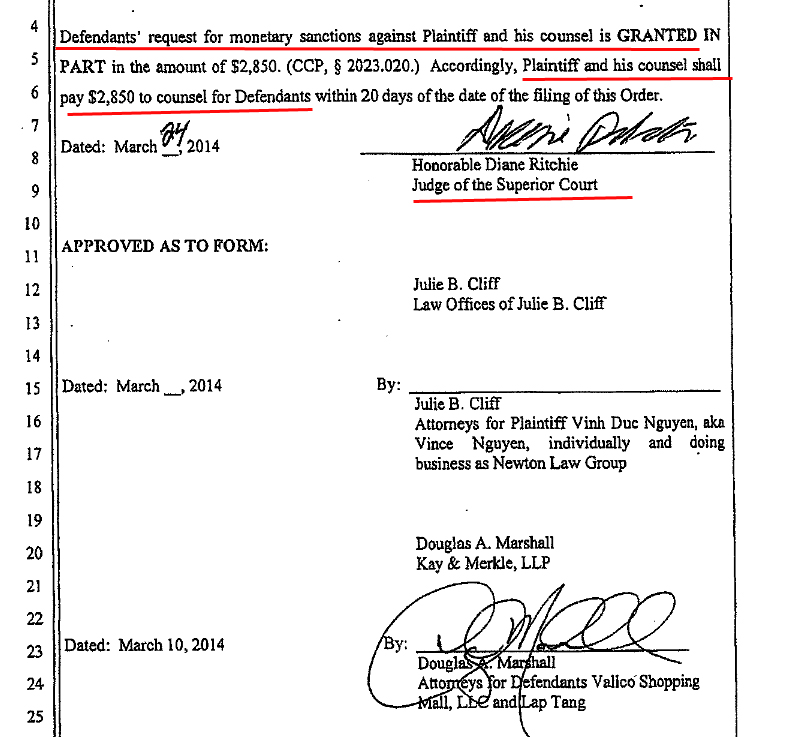
The order says "Defendants' request for monetary sanctions against Plaintiff and his counsel is GRANTED .... Plaintiff and his counsel shall pay $2,850 to counsel for Defendants ...."
The order refers to Julie B. Cliff as attorney for plaintiff, but she did not sign-off to approve the order.
Another Update: Attorney Julie Cliff sent us an email we took as a threat. She said:
"Your article is intentionally worded to give the impression that I was singled out for particular chastisement. I was not. The court used standard language which makes the obligation a joint obligation. Your article also clearly attempts to give the impression that there was particular additional punishment directed to me personally that was “substantial.” Again, it was not.
The entire theme of your article and its implications is clear. I must say that I will take seriously any attempts of your organization to cast me in a false light and harm my reputation as an attorney."
The fact is attorney Julie Cliff WAS singled out for particular chastisement by the judge.
Again, read what the judge said:
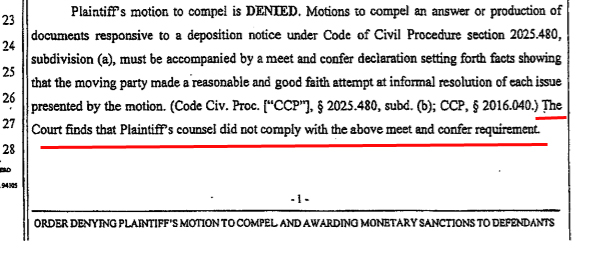
Plaintiff's counsel is Julie Cliff.
The judge then imposed sanctions against plaintiff's counsel - who was Julie Cliff.

The real question is what did Ms. Cliff's client do to deserve getting sanctioned? Besides having Julie Cliff as his attorney?
There is nothing we see in the court's order mentioning specific wrongdoing by the client. Meeting and conferring and filing a declaration about meet and confer efforts to justify a motion are, in Lawzilla's opinion, what attorneys do. Not clients.
Did attorney Cliff do anything to protect her client from being sanctioned, such as taking responsibility for the meet and confer efforts and asking the judge not to sanction her client?
Chesley v Wells Fargo - Alameda County Superior Court Case Number RG14-716082.
According to the court of appeal's decision it is Lawzilla's understanding this happened:
Attorney Julie Cliff represented the plaintiff in a foreclosure case against Wells Fargo.

The bank filed a motion for summary judgment, which was ultimately granted.
At about the same time attorney Cliff was replaced and an appeal was then filed.
The appeal involved a claim that Ms. Cliff did not adequately represent her client and the plaintiff tried to set aside the judgment. The court of appeals opinion notes various claims were made against Julie Cliff, Esq.:
"Catalina's declaration states that ... she became 'extremely concerned that attorney Cliff had done nothing towards opposing' the summary judgment motion."
"Catalina [said she] was 'shocked to learn' that Cliff had not presented the Wells Fargo documents they discussed to the trial court and contacted another attorney"
"Chesley contends that she is entitled to relief from the judgment because 'the actions (and inactions) of attorney Julie Cliff amount to attorney abandonment and prevented [Chesley] from having a meaningful opportunity to challenge [Wells Fargo's] motion for summary judgment.'"
"She makes the following contentions regarding Cliff's 'abandonment' of her as a client:""(1) she 'did not meaningfully prepare an opposition' to the motion for summary judgment";
"(2) she failed to timely file the opposition";
"(3) the opposition 'was so poorly prepared that respondent Wells Fargo actually joked about it in its reply'"; and
"(4) despite the fact that the trial court granted Cliff's continuance of the motion for summary judgment, 'she did not prepare any further opposition' and instead filed a motion to withdraw the day before the summary judgment hearing."
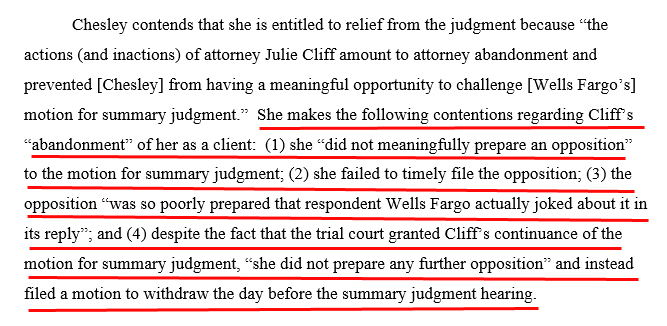
The court of appeals affirmed denial of the motion to set aside the judgment, finding it was untimely, did not show attorney abandonment, and failed to provide a proposed new pleading to be filed.
In particular, with respect to the allegations of improprieties by attorney Julie Cliff, in Lawzilla's opinion and read of the case the court of appeals does not address each allegation individually, but did say that:
"In this case, a substantive opposition including a memorandum of points and authorities, declarations, and a separate statement was filed. While it was timely served but late filed, it was considered on its merits by the trial court. Hence, Chesley has presented no evidence of 'total abandonment' by Cliff.
...
Further, while Cliff did not appear at the summary judgment hearing, the trial court noted at the hearing that Cliff's motion to withdraw as counsel included 'that the client is insisting on protecting a claim or defense that's not warranted under existing law.'
...
the record falls far short of demonstrating that Cliff engaged in 'positive misconduct' that resulted in her total abandonment of Chesley as a client."
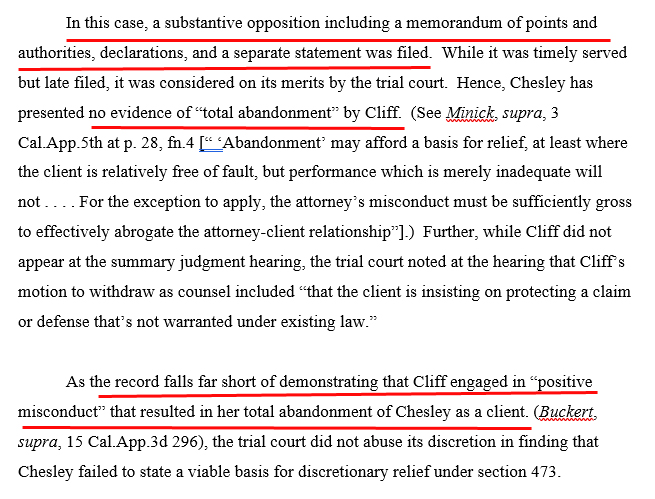
Attorney Julie Cliff had this to say about the appellate decision:
"An attorney is at a disadvantage is defending herself against claims made by a client due to attorney-client privilege. An attorney cannot divulge those communications until and unless the client has waived the privilege. Regardless, I can respond to statements made to the court. The representations that Chesley made to the court regarding the communications between Catalina Chesley and Julie Cliff include false statements, include distorted statements, and omit material information that would shed light on the subject attorney client relationship and what occurred prior to the filing of the opposition to motion for summary judgment. I am quite sure that Ms. Chesley was attempting to forge ahead with her case and take advantage of any available opportunity to prevail. For that, I do not fault a client. I want my clients to succeed. I have to draw the line, however, when a client attempts to “throw me under the bus” in the process. The statements made to the court in this instance should not have been made. The court’s ruling was correct under the circumstances.
I have been a practicing attorney for 16 years and have had hundreds of satisfied clients. It is disappointing that this situation developed, but at a certain point there is nothing more than can be done."
Is attorney Cliff correct that she can respond to statements made to a court and say her former client made "false statements", "distorted statements" and "omit material information"?
The court of appeal noted a "declaration" was involved, which Lawzilla believes would be made under penalty of perjury, and likely anything said to the court to support a motion had to be in declaration form to be considered.
Basically, we believe one could read Cliff's statement and conclude Julie Cliff accused her former client of perjury, which is a crime, by making false and distorted statements to a court.
Someone committing perjury can be sent to state prison. We saw this online from the Shouse California Law Group:
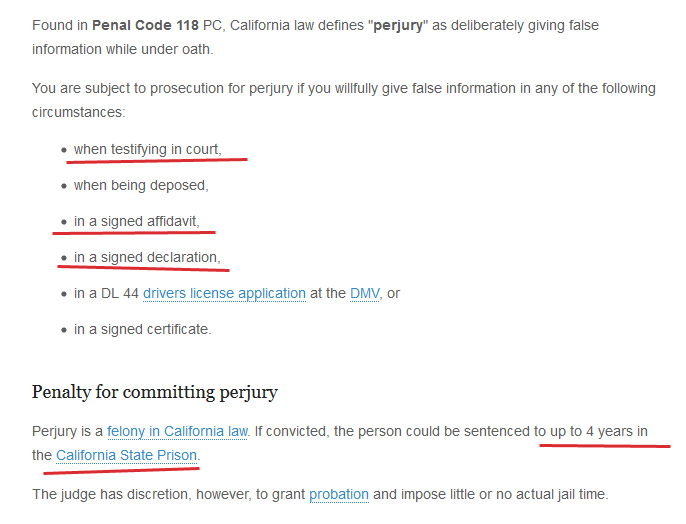
Business and Professions Code section 6068(e)(1) requires that an attorney maintain confidential information of their client "and at every peril to himself or herself to preserve the secrets, of his or her client".
Section 6068(f) further prohibits an attorney from claiming a "fact prejudicial to the honor or reputation of a party".
An attorney cannot disclose that a client has committed a crime. (People v. Singh (1932) 123 Cal.App. 365)
An "attorney's lips are forever sealed" even if she is fired by her client. (Wutchumna Water Co. v. Bailey (1932) 216 Cal. 564)
An attorney cannot disclose that a former client has committed perjury. (Los Angeles Bar Association Opinion 386)
It seems to us that only by using confidential information known to an attorney (and supposed to be protected at all costs) could Ms. Cliff know that what a former client is saying to a court is false.
Cliff specifically says she is referring to communications between her and her client, which to us seems like confidential attorney-client privileged information, and that her client's recitation to the court is in part false.
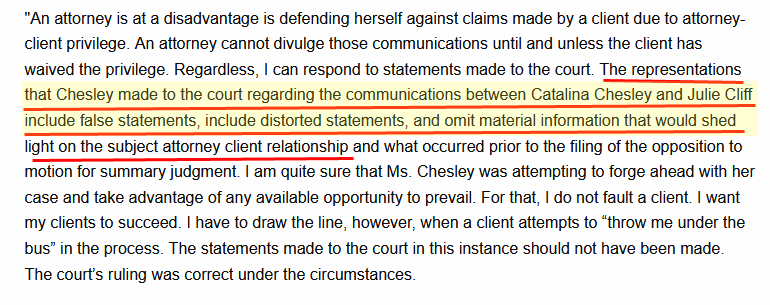
Lawzilla's research indicates an attorney breaching their duty of confidentiality can:
- Be disciplined by the California State Bar.
- Be sued for malpractice and breach of a fiduciary duty.
What do you think? If attorney Cliff's former client reports her to the State Bar, do you think Ms. Cliff may be disciplined, suspended or disbarred? Or is she in the clear?
Lawzilla's opinion is even if an attorney thinks a client is throwing them under the bus, that is not a valid reason for using or disclosing confidential information against the client, and not a valid reason to accuse them of making false statements to a court.
In Lawzilla's opinion, for an attorney to claim otherwise is disturbing, and to do otherwise reflects on their judgment and professional abilities.
Julie Cliff was admitted to the California Bar in 2003. Bar Number 226443.
Former Address:
Law Office of Julie Cliff
1361 South Winchester Boulevard, Suite 111
San Jose, California 95128
Law Office of Julie Cliff
20 South Santa Cruz Avenue Suite 300
Los Gatos, California 95030
Law School: Lincoln Law School in San Jose
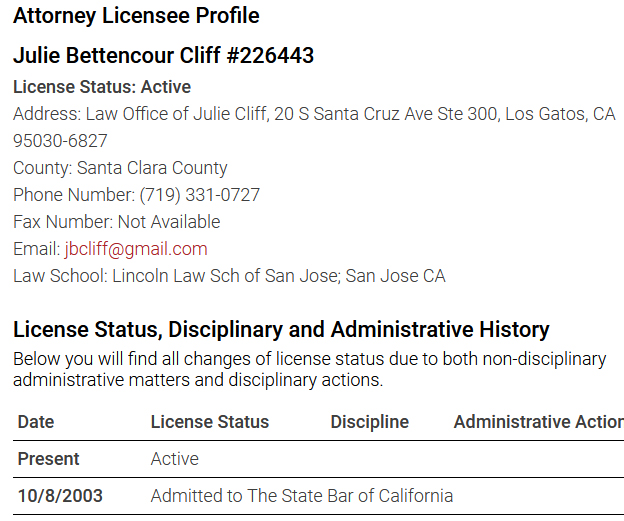
Sanctions are Recoverable as a Judgment - Analysis of the little known fact that sanctions awarded in a lawsuit can be enforced as their own separate judgment. Surprise someone by putting a lien on their bank account, home, wages, etc.